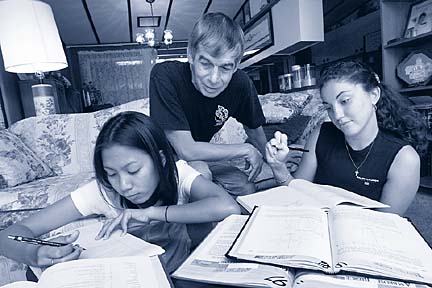

[ TEACHER STRIKE ]

Sixteen-year-old Anya Kostina spent her days at first during the teachers strike surfing at Waikiki Beach, observing Hawaiian artifacts at Bishop Museum and reading a Russian novel, "Master and Margarita." Foreign students grow
more anxious as strike eats
up their time in HawaiiBy Rosemarie Bernardo
Star-BulletinBut now with the strike in its third week, Ukrainian native Kostina grows anxious to return to her studies at Kalani High School.
"I came here to improve my English and to learn more about American life," said Kostina. "I'm not getting educated."
High school exchange students from the former Soviet Union, independent states and other foreign countries hosted by local families through the International Hospitality Center hope the state and the Hawaii State Teachers Association find a middle ground to end the strike.
Kostina is staying in Hawaii through the "Future Leaders Exchange" program administered by the federal government under the Freedom Support Act.
"I was kind of shocked," said Kostina. "I didn't realize when I came to America that they were going to strike."
For the remaining school year, Kostina, a junior, lives with her host family, Robert Littman, a professor of Greek and Latin at the University of Hawaii-Manoa, and wife Bernice in Kahala.
Littman, who recently returned to teaching after the University of Hawaii Professional Assembly reached a contract agreement with the state Tuesday night, said: "I'm fully behind the teachers. They're underpaid and overworked."
"I hope they get the highest settlement they can get," Littman said.
Like Kostina, Argentine exchange student Santiago Scully's main goal to study in the United States was to master the English language.
"I don't learn that much English as if I was in school," said Scully, a senior attending Farrington High School.
Scully lives with Petty Officer 1st class Irene Stone and her 7-year-old daughter, Chelsea, in Ewa Beach.
If the strike continues, Santiago is worried he will not be able to finish the school year before his six-month student visa ends on June 28.
However, the state is sending a memo to all public schools that students will not be penalized for the school days missed because of the strike.
"I don't want to have another year of high school," he said.
Since Kostina and Scully have parents who are educators in their native country, they understand Hawaii's teachers demand for a 22 percent pay raise.
"It's hard work," said Kostina. "You have to love what you're doing."
Littman said the problem not only lies with the teachers' pay increase, but also the lack of resources and working conditions provided to teachers and students.
"Until you have a decent facility and resources, it's difficult for students to get a decent education," he said.
Alexandra Astafjeva, a junior from Ukraine attending Radford High School, said she did not expect the strike to last for more than two days.
Astafjeva said she does not favor either party in the strike but is absorbing how the democratic political system works through the negotiations between the state and the teachers union.
Although Astafjeva's host father, Don Whye, believes the teachers deserve a pay raise, he said he would like the strike to end soon for the sake of his "kids."
"They only thing I want is to get my kids back in school," said Whye.
>> HSTA Web site
>> State Web site
>> Governor's strike Web site
>> DOE Web site
>> UHPA Web site